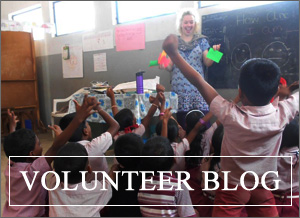Lots of volunteers worry about being able to communicate with their host family if they speak little or no English, having been placed with a host family myself with VESL who spoke little to no English (although this didn’t stop them trying!), I have put together some handy tips to help you communicate:
1. Learn some of the host language – having some basic knowledge of the local language is very important, your host family will want to know where you’re going and when you’re due back, so being able to say ‘I am going to…..’ in the local language is very important (you can easily mime what time you’ll be back by making gestures and showing the time on your hands). It is also important for being able to say you don’t want any more food, as trust me that rice will be piled on your plate if you don’t say something (again hand gestures will help!). Knowing how to structure a sentence in the local language is also helpful when you’re teaching English as it helps you understand why students may struggle putting together sentences in English.
You can pick up some words from your host family too by pointing to things to ask what it is, so you can slowly build up your knowledge of the local language when you’re out there. At the same time you can teach them English in the same way if they’re interested. We had one volunteer who spent hours with her host mother walking around different places and pointing to things so they could learn the word in each others language.
Don’t be offended if your host family laugh at you when you’re trying to say something in their language, I once told my host family I was going to the beach, and my host mother ran to get the neighbour in hysterics so I could repeat the sentence to her! People aren’t making fun of you if they do this, they are normally just so thrilled that you’ve made an effort that they want the world to know!!
2. Rely on your body language – body language is universal , so simple gestures (and a smile) will get you a long way! Most things you say you will be able to act out to some extent and remember facial expressions also help to convey how you’r’e feeling.
3. Drawing –if you’re struggling to communicate through actions, drawing an image may help you explain what you want or are trying to communicate.
4. Speak slowly – If you’re host family can speak some English make sure you are speaking slowly and in basic English and avoid colloquialisms as much as possible (um, like, err), this will help them to understand more. Try adding in actions to help people understand what you’re saying. It is tempting to shout if someone doesn’t understand what you’re saying, but remember that this isn’t going to help.
Be patient if you don’t understand what someone is trying to say to you, remember they’re making the effort to speak in English to you. If you’re struggling learning the local word or phrase for ‘I don’t understand’ will be very helpful.
5. Write it down – Try writing something down if your host family speak some English but are struggling to understand, different accents can be hard to understand to a non-native speaker, so writing it down may help.
You will be surprised how easy it is to communicate with people who don’t speak to same language as you so don’t panic! If you’re worried a great thing to do when you first arrive is to take out your pictures of your family and show them to your host family.
Will I be lonely?
A lot of volunteers are concerned they will be lonely if there host family don’t speak English but there are lots of games you can play that don’t involve speaking the same language, from card games (demonstrated by playing, you may also learn some local card games) to games like connect-four, battleships and other travel games. There are also often local games that you may be taught, for example in parts of Sri Lanka and Kerala ‘carroms’ is a type of board game that is very popular.
Offering to help cook dinner with your host family is a great way to spend time with your family, to learn how to cook the local food and this involves relatively little communication. A lot of volunteers will also spend time watching the local TV channels and become enthralled by the local soaps, several volunteers have become quite addicted to the local Keralan soaps!!
If there are young people in your family or children then they are often eager to spend time with volunteers, the children in my host family used to help me make resources for school the next day and loved to play with my ABC cards, that we made together, to spell out English words (it normally involved a race between the two children). We played numerous games from hide and seek to snap, and sang a lot of songs!
There are also plenty of opportunities to get yourself involved in the local community, remember you can make friends when you’re out here too!
So in short… it is very unlikely you will be lonely, there are plenty of things to get involved with, whether that’s at school, in the community or with your host family. You’ll probably be wondering when you can actually squeeze in some relaxing time!





Comments are closed.